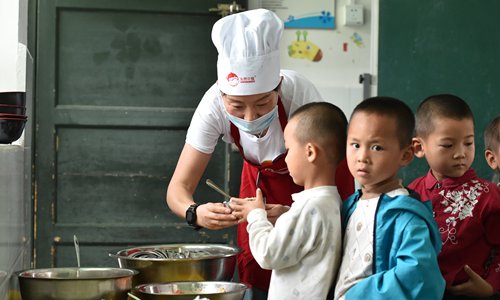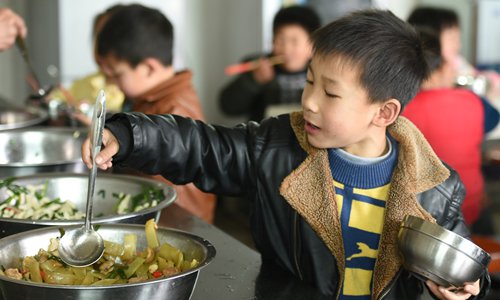
From the People's Daily App.
This is Story in the Story.
Support from the government and society in China ensures that disadvantaged children in rural areas enjoy nutrient-rich and hygienic meals every day for free.
Many netizens are also following what children eat every day on the social networking site Sina Weibo.
Dai Xing, an official in the bureau of education in Maguan county, Southwest China's Yunnan Province, said that in the early days of the founding of the People's Republic of China, Chinese people generally had difficulty getting enough food and clothing.
"The government and society not only give food to children in poor areas, but they also make efforts to provide nutrition-rich meals, paying special attention to children's health," said Dai.
In the 70 years since the country's founding in 1949, China has strengthened itself in numerous aspects and the living standards of Chinese people have improved significantly, Dai said, adding that the countryside is now accessible by road, which makes it easier to transport fresh vegetables into the mountainous areas where these children live.
Today’s Story in the Story looks at how providing free meals for disadvantaged students in rural areas is conducive to the healthy mental and physical growth of children.

Pupils are queuing for lunch at Jiubu elementary school in Shitai county, East China's Anhui Province on May 20, 2019. (Photo: Global Times)
Since the fall term of 2011, the Ministry of Education (MOE) has implemented a plan for improving the nutrition of rural students receiving compulsory education, and provided them with a subsidy of three yuan ($0.42) per person per day, which rose to four yuan in November 2014, according to a report released by MOE in 2017.
The nutrition improvement program for rural students receiving compulsory education covers all poverty-stricken counties, benefiting 37 million rural students, Xinhua News Agency reported in 2017.
In April 2011, 500 journalists, dozens of domestic mainstream media outlets and the China Social Welfare Foundation launched Free Lunch for Children (FLC), with an initial donation of three yuan per day (since the 2015 fall semester, this has increased to four yuan per meal due to rising prices), to help children avoid hunger by allowing them to enjoy free hot lunches.
Su Zhefang, secretary general of FLC, said that it has been cooperating with the national program in many schools, mainly those located in Central China's Hubei and Hunan provinces and Southwest China's Yunnan and Sichuan provinces.
In particular, the national program supports meals for students during their years of compulsory education, and FLC supports meals for preschool children and staff, chef salaries, kitchen hardware facilities, water, electricity, fuel and other associated operating expenses according to the schools' needs, Su explained.
By August 2019, a total of 1,223 schools had joined FLC, benefiting more than 310,000 students and teachers with more than 500 million yuan raised in total, Su said.

A school boy picks his favorite dish at Xiacun elementary school in Long'an town, Fuzhou, East China's Jiangxi Province. (Photo: Global Times)
There are 115 children in Wumu elementary school in Maguan county, including 80 boarding pupils, who enjoy this national support, and 35 kindergarten children who are supported by FLC.
Maguan county is one of the 27 state-level poverty-stricken counties in Yunnan, located on the border between China and Vietnam.
Dai said that many of the students are left-behind children whose parents are working far away, leaving the children in the care of their grandparents.
Most of these elderly grandparents don't pay particular attention to the nutritional variety of the meals they prepare, and some children have the same dish for a whole week during summer and winter vacations.
Liu Yekun, a third-grade boy, said he prefers the food at school because he can have fresh meat and vegetables for every meal, while his family always cooks with preserved meat. His favorite food is pork and eggs.
Wang Zhiqiang, a math teacher in Wumu, is also in charge of publishing details of meals on Sina Weibo to let donors know how their donations are being spent.
Wang said that dishes are published on Weibo not only for supervision but also to draw the attention of netizens and encourage them to take part in caring for children.
Yang Ya'nan, an 8-year-old girl at Wumu, said that she is grateful to the government and the many kind people across the country that provide free meals to her and her classmates.
"I hope these uncles and aunts, who care about whether I have nutritious food at every meal, will also order less take-away food and eat more vegetables themselves."
(Produced by Nancy Yan Xu, Brian Lowe, Lance Crayon and Paris Yelu Xu. Music by: bensound.com. Text from Global Times.)


